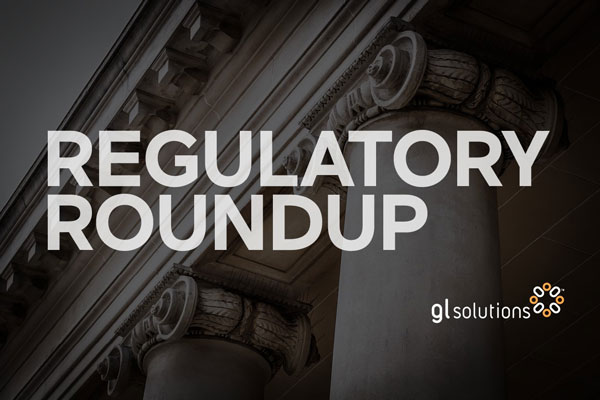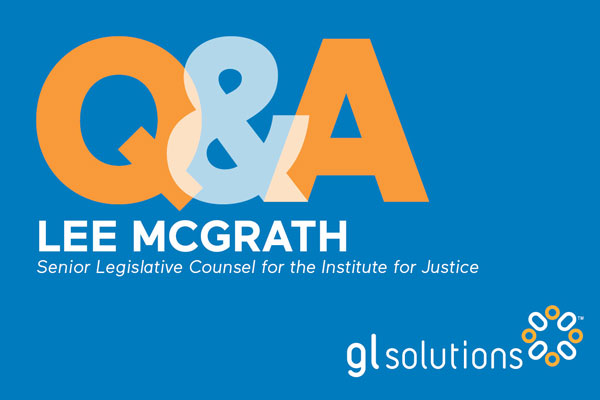Lee McGrath is senior legislative counsel for the Institute for Justice, a Virginia-based nonprofit that seeks to limit the size and scope of government power in defense of individual liberty. Among other things, the Institute pursues occupational licensing reforms at the state and local levels. McGrath has agreed to answer questions about the Institute’s outlook and reform activity. We’d like to thank him for participating.
We recognize that many of the regulatory professionals who read this newsletter may not agree with the Institute’s work. Our intent is to provide information that is both relevant and interesting to licensing professionals. Such information includes the work of organizations with which licensing officials often find themselves at odds.
Q: Occupational licensing reflects an attempt to balance the economic needs of professionals with the safety needs of consumers. Assuming you agree with that definition, how do you believe lawmakers and regulatory boards should strike that balance?
A: My colleagues at the Institute for Justice (IJ) and I would define occupational licensing differently. It’s a government permission slip to work in your chosen field. It creates barriers to entry, and those barriers deliver the economic benefits of restricted competition to a select few who get in at the expense of those shut out and consumers.
So, the balancing required of lawmakers and regulatory boards is between (a) open occupational entry and consumer choice and (b) public health and safety. Professionals’ economic interests should not be part of that equation.
In fact, legislators and regulatory boards should never consider “economic needs of professionals.” Protectionism is an illegitimate government function. The state’s police powers exist solely to protect public health and safety—not to distribute premia or credentials to favored workers.
Q: What’s the biggest problem you see in occupational licensing and how would you fix it?
A: Unfortunately, the political process encourages such protectionism. Professional associations almost always are the ones seeking to be licensed; consumers aren’t clamoring for more regulation. The associations are well-organized and can bring political pressure to bear. They are often the only ones showing up in state capitols. State lawmakers also are stretched thin, without the time and resources to scrutinize their claims. This makes them vulnerable to giving undue weight to poor evidence and outlandish anecdotes—such as the unfounded claim that 88,000 people will die if Florida repeals its licensing of interior designers. The system tilts toward adopting needless licensing that benefits the few at the expense of the many.
Aspiring workers and consumers would be far better off if legislators used IJ’s sunrise and sunset review model legislation. It provides for independent analysis and fact-finding that lawmakers lack the time to do, and it prescribes how legislators can select the “least restrictive regulation” to balance (a) and (b). Many legislators would choose less-restrictive inspections or certification if they were presented with a useful analytical process and more regulatory choices than just the binary choice of no regulation versus occupational licenses.
Q: Occupational licensing boards have had to make many adjustments in response to the COVID pandemic, from scope-of-practice expansions to the accelerated adoption of telemedicine. In your view, how have these adjustments, often adopted very quickly, changed the landscape for regulatory reform going forward?
A: Not enough.
Some thoughtful state legislators will be more apt to repeal certificate-of-need laws and reform occupational licensing requirements related to personal qualifications, scope of practice and interstate recognition after seeing the benefits of these reforms.
Unfortunately, some boards and trade associations oppose making these proven benefits permanent and legislators may be deferential to their input.
Q: Though the Institute for Justice seems to focus primarily on litigation, you also do quite a bit of work with state legislatures. What are some of the occupational licensing reform efforts you’re focusing on now?
A: Since opening its doors in 1991, IJ has focused on helping its clients reach the first rung of the economic ladder. This is best seen in our litigation and lobbying to free hair braiders from cosmetology regulations. Earlier in 2021, Wisconsin became the 31st state to exempt braiders from cosmetology licensing.
We will continue to advocate to reduce requirements for entry-level occupations, particularly as it relates to cosmetology, barbering, and providers of niche-beauty services such as shampooers, eyebrow threaders and, of course, braiders.
Readers should check out IJ’s new research “Beauty School Debt and Drop-Outs.” It shows that cosmetology licensing has many problems, including that more than 60 percent of students borrow a lot of money and fewer than 30 percent of students graduate on time.
We also will promote other legislation to make it easier for individuals to pursue their callings.
Q: What are some occupational licensing reform initiatives you expect lawmakers to be considering five years from now?
A: Medical certification with overlapping scopes of practice that provides a means for medical payments.
The consumer protection from online reviews will continue to grow and make, at an increasingly faster rate, traditional licensing obsolete. But America’s system of third-party payers for medical services requires some identification of occupations. Legislators will need to reduce the turf battles in the scopes of medical practices but still provide means for different rates of reimbursement to different medical providers by Medicare, Medicaid and insurance companies.
Q: Maybe this is just my perception, but the number of occupational licensing reform bills across the country seems to be increasing. Is this true, and if so, why?
A: Your perception is right for at least two reasons.
First, state legislators are particularly aware of the power of reputation. They know firsthand that technology can play a positive role to help voters/consumers make informed choices.
Secondly, licensing reform is attracting new advocates because licensing’s burdens are increasingly becoming known. New advocates see deregulation through the lenses of racial, class and criminal justice.
In fact, even unions are advocating for reduced regulations in labor markets. In October, Governor Gavin Newsom signed SB 803 into California law. It reduced the required hours to become a cosmetologist from 1,600 to 1,000 hours. The bill got out of a committee in the Assembly because it enjoyed the support of the United Food and Commercial Workers International Union. Other unions support universal recognition of licenses from other states to increase their memberships.
Lee McGrath is the Institute for Justice’s senior legislative counsel. He also is the managing attorney at IJ’s office in Minneapolis, Minn. His email address is Lmcgrath@ij.org, and IJ’s legislative team’s webpage is www.ij.org/legislation


